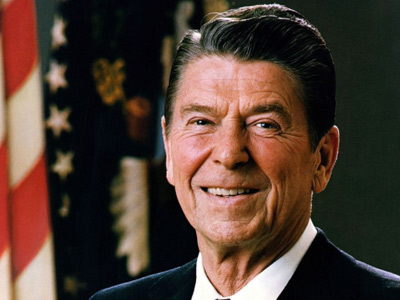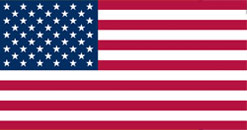Ronald Reagan (1911-2004)
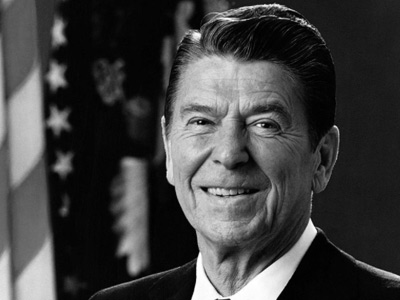
Legacy
Since Reagan left office in 1989, substantial debate has occurred among scholars, historians, and the general public surrounding his legacy. Supporters have pointed to a more efficient and prosperous economy as a result of Reagan's economic policies, foreign policy triumphs including a peaceful end to the Cold War, and a restoration of American pride and morale. Proponents also argue Reagan restored faith in the American Dream with his unabated and passionate love for the United States, after a decline in American confidence and self-respect under Jimmy Carter's perceived weak leadership, particularly during the Iran hostage crisis, as well as his gloomy, dreary outlook for the future of the United States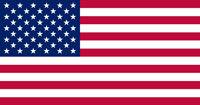 The United States of America (U.S.A. or USA), commonly known as the United States (U.S. or US) or America, is a country in North America. It is the world's third-largest country by both land and total area. The United States shares land borders with Canada to its north and with Mexico to its south. The national capital is Washington, D.C., and the most populous city and financial center is New York City. during the 1980 election. Critics contend that Reagan's economic policies resulted in rising budget deficits, a wider gap in wealth, and an increase in homelessness and that the Iran–Contra affair lowered American credibility.
The United States of America (U.S.A. or USA), commonly known as the United States (U.S. or US) or America, is a country in North America. It is the world's third-largest country by both land and total area. The United States shares land borders with Canada to its north and with Mexico to its south. The national capital is Washington, D.C., and the most populous city and financial center is New York City. during the 1980 election. Critics contend that Reagan's economic policies resulted in rising budget deficits, a wider gap in wealth, and an increase in homelessness and that the Iran–Contra affair lowered American credibility.
Opinions of Reagan's legacy among the country's leading policy makers and journalists differ as well. Edwin Feulner, president of The Heritage Foundation, said that Reagan "helped create a safer, freer world" and said of his economic policies: "He took an America suffering from 'malaise'... and made its citizens believe again in their destiny." However, Mark Weisbrot, co-Director of the Center for Economic and Policy Research, contended that Reagan's "economic policies were mostly a failure" while Howard Kurtz of The Washington Post opined that Reagan was "a far more controversial figure in his time than the largely gushing obits on television would suggest."
Despite the continuing debate surrounding his legacy, many conservative and liberal scholars agree that Reagan has been the most influential president since Franklin D. Roosevelt, leaving his imprint on American politics, diplomacy, culture, and economics through his effective communication, dedicated patriotism and pragmatic compromising. Since he left office, historians have reached a consensus, as summarized by British historian M. J. Heale, who finds that scholars now concur that Reagan rehabilitated conservatism, turned the nation to the right, practiced a considerably pragmatic conservatism that balanced ideology and the constraints of politics, revived faith in the presidency and in American exceptionalism, and contributed to victory in the Cold War.
Cold War
The Cold War was a major political, economic and military endeavor for over four decades, but the confrontation between the two superpowers had decreased dramatically by the end of Reagan's presidency. The significance of Reagan's role in ending the Cold War has spurred contentious and opinionated debate. That Reagan played a role in contributing to the downfall of the Soviet Union Soviet Union, officially the Union of Soviet Socialist Republics (USSR), was a transcontinental country that spanned much of Eurasia from 1922 to 1991. The Soviet Union fall process began with growing unrest in the Union's various constituent national republics developing into an incessant political and legislative conflict between them and the central government. Estonia was the first Soviet republic to declare state sovereignty inside the Union. is agreed, but the extent of this role is continuously debated, with many believing that Reagan's defense policies, economic policies, military policies and hard line rhetoric against the Soviet Union and Communism, as well as summits with General Secretary Gorbachev played a significant part in ending the Cold War.
Soviet Union, officially the Union of Soviet Socialist Republics (USSR), was a transcontinental country that spanned much of Eurasia from 1922 to 1991. The Soviet Union fall process began with growing unrest in the Union's various constituent national republics developing into an incessant political and legislative conflict between them and the central government. Estonia was the first Soviet republic to declare state sovereignty inside the Union. is agreed, but the extent of this role is continuously debated, with many believing that Reagan's defense policies, economic policies, military policies and hard line rhetoric against the Soviet Union and Communism, as well as summits with General Secretary Gorbachev played a significant part in ending the Cold War.
He was first among post – World War II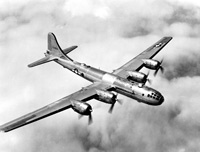 World War II or the Second World War, often abbreviated as WWII or WW2, was a world war that lasted from 1939 to 1945. It involved the vast majority of the world's countries—including all of the great powers—forming two opposing military alliances: the Allies and the Axis powers. World War II was a total war that directly involved more than 100 million personnel from more than 30 countries. World War II is generally considered to have begun on 1 September 1939, when Nazi Germany, under Adolf Hitler, invaded Poland. View World War II » presidents to put into practice the concept that the Soviet Union could be defeated rather than simply negotiated with, a post-Détente strategy, a conviction that was vindicated by Gennadi Gerasimov, the Foreign Ministry spokesman under Gorbachev, who said that the Strategic Defense Initiative was "very successful blackmail. ...The Soviet economy couldn't endure such competition." Reagan's aggressive rhetoric toward the USSR had mixed effects; Jeffery W. Knopf observes that being labeled "evil" probably made no difference to the Soviets but gave encouragement to the East-European citizens opposed to communism.
World War II or the Second World War, often abbreviated as WWII or WW2, was a world war that lasted from 1939 to 1945. It involved the vast majority of the world's countries—including all of the great powers—forming two opposing military alliances: the Allies and the Axis powers. World War II was a total war that directly involved more than 100 million personnel from more than 30 countries. World War II is generally considered to have begun on 1 September 1939, when Nazi Germany, under Adolf Hitler, invaded Poland. View World War II » presidents to put into practice the concept that the Soviet Union could be defeated rather than simply negotiated with, a post-Détente strategy, a conviction that was vindicated by Gennadi Gerasimov, the Foreign Ministry spokesman under Gorbachev, who said that the Strategic Defense Initiative was "very successful blackmail. ...The Soviet economy couldn't endure such competition." Reagan's aggressive rhetoric toward the USSR had mixed effects; Jeffery W. Knopf observes that being labeled "evil" probably made no difference to the Soviets but gave encouragement to the East-European citizens opposed to communism.
General Secretary Gorbachev said of his former rival's Cold War role: "[He was] a man who was instrumental in bringing about the end of the Cold War," and deemed him "a great president." Gorbachev does not acknowledge a win or loss in the war, but rather a peaceful end; he said he was not intimidated by Reagan's harsh rhetoric. Margaret Thatcher, former Prime Minister of the United Kingdom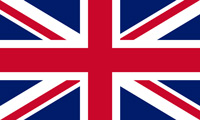 The United Kingdom of Great Britain and Northern Ireland, commonly known as the United Kingdom (UK) or Britain, is a country in Europe, off the north-western coast of the continental mainland. It comprises England, Scotland, Wales and Northern Ireland. The UK became the world's first industrialised country and was the world's foremost power during the 19th and early 20th centuries., said of Reagan, "he warned that the Soviet Union had an insatiable drive for military power... but he also sensed it was being eaten away by systemic failures impossible to reform." She later said, "Ronald Reagan had a higher claim than any other leader to have won the Cold War for liberty and he did it without a shot being fired." Said Brian Mulroney, former Prime Minister of Canada
The United Kingdom of Great Britain and Northern Ireland, commonly known as the United Kingdom (UK) or Britain, is a country in Europe, off the north-western coast of the continental mainland. It comprises England, Scotland, Wales and Northern Ireland. The UK became the world's first industrialised country and was the world's foremost power during the 19th and early 20th centuries., said of Reagan, "he warned that the Soviet Union had an insatiable drive for military power... but he also sensed it was being eaten away by systemic failures impossible to reform." She later said, "Ronald Reagan had a higher claim than any other leader to have won the Cold War for liberty and he did it without a shot being fired." Said Brian Mulroney, former Prime Minister of Canada Canada is a country in North America. Its ten provinces and three territories extend from the Atlantic Ocean to the Pacific Ocean and northward into the Arctic Ocean. Indigenous peoples have continuously inhabited what is now Canada for thousands of years. Beginning in the 16th century, British and French expeditions explored and later settled along the Atlantic coast. As a consequence of various armed conflicts, France ceded nearly all of its colonies in North America in 1763.: "He enters history as a strong and dramatic player [in the Cold War]." Former President Lech Wałęsa of Poland acknowledged, "Reagan was one of the world leaders who made a major contribution to communism's collapse." That Reagan had little or no effect in ending the Cold War is argued with equal weight; that Communism's internal weakness had become apparent, and the Soviet Union would have collapsed in the end regardless of who was in power. President Harry S. Truman's policy of containment is also regarded as a force behind the fall of the USSR, and the Soviet invasion of Afghanistan undermined the Soviet system itself.
Canada is a country in North America. Its ten provinces and three territories extend from the Atlantic Ocean to the Pacific Ocean and northward into the Arctic Ocean. Indigenous peoples have continuously inhabited what is now Canada for thousands of years. Beginning in the 16th century, British and French expeditions explored and later settled along the Atlantic coast. As a consequence of various armed conflicts, France ceded nearly all of its colonies in North America in 1763.: "He enters history as a strong and dramatic player [in the Cold War]." Former President Lech Wałęsa of Poland acknowledged, "Reagan was one of the world leaders who made a major contribution to communism's collapse." That Reagan had little or no effect in ending the Cold War is argued with equal weight; that Communism's internal weakness had become apparent, and the Soviet Union would have collapsed in the end regardless of who was in power. President Harry S. Truman's policy of containment is also regarded as a force behind the fall of the USSR, and the Soviet invasion of Afghanistan undermined the Soviet system itself.
Domestic and Political Legacy
Reagan reshaped the Republican party, led the modern conservative movement, and altered the political dynamic of the United States. More men voted Republican under Reagan, and Reagan tapped into religious voters. The so-called "Reagan Democrats" were a result of his presidency.
After leaving office, Reagan became an iconic influence within the Republican party. His policies and beliefs have been frequently invoked by Republican presidential candidates since 1988. The 2008 Republican presidential candidates were no exception, for they aimed to liken themselves to him during the primary debates, even imitating his campaign strategies. Republican nominee John McCain frequently said that he came to office as "a foot soldier in the Reagan Revolution." Reagan's most famous statement regarding the role of smaller government was that "Government is not a solution to our problem, government is the problem."
Reagan has become an iconic figure in the Republican Party, with praise for his accomplishments part of the standard GOP rhetoric a quarter century after his retirement. Washington Post reporter Carlos Lozada notes how in the 2016 presidential race the main Republican contenders adopted "standard GOP Gipper worship," including even Donald Trump, who previously had been skeptical.
The period of American history most dominated by Reagan and his policies concerning taxes, welfare, defense, the federal judiciary and the Cold War is known today as the Reagan Era, and emphasizes that the conservative "Reagan Revolution," led by Reagan, had a permanent impact on the United States in domestic and foreign policy. The Bill Clinton administration is often treated as an extension of the Reagan Era, as is the George W. Bush administration. Historian Eric Foner noted that the Obama candidacy in 2008 "aroused a great deal of wishful thinking among those yearning for a change after nearly thirty years of Reaganism."
HISTORY
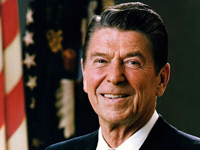
RESOURCES
This article uses material from the Wikipedia article "Ronald Reagan (1911-2004)", which is released under the Creative Commons Attribution-Share-Alike License 3.0.
© Stories Preschool. All Rights Reserved.
